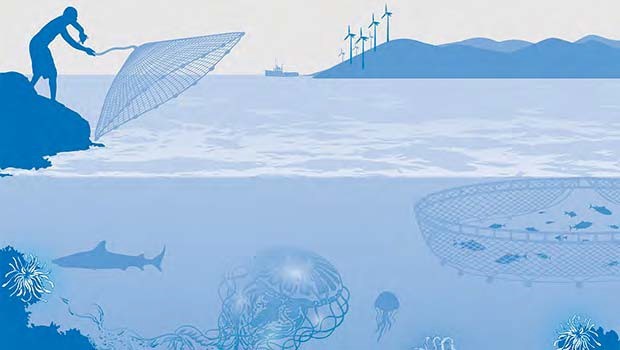![]()
The Cowrie – SIDS Times Magazine Fall 2017 Online Edition – Back to Table of Contents

Money in a shell
The ‘blue economy’ is an evolving concept that recognizes the need to maximize economic potential of oceans, while preserving it for future generations. Increasingly, small states are embracing the blue economy as a mechanism for realising sustainable growth. It presents a promising avenue for small states to overcome some of their inherent economic challenges, by developing blue businesses, increasing economic diversification and realising growth embedded in the fundamental principles of environmental sustainability. With recent advances in technology, potential blue economy growth areas for small states have increased and now include aquaculture, ocean-based renewable energy and marine biotechnology.
The Commonwealth has a long history of supporting small states on ocean management and sustainability, and is at the forefront of promoting the blue economy as a holistic concept that can address sustainable development policies and programmes at multiple levels. An issue of The Commonwealth’s triannual publication Small States Digest (Commonwealth, 2016) explored the requirements for small states to effectively pursue a blue economy
development approach. This article briefly summarises the section focused on the six enabling factors necessary to fully realise a blue economy. It
also highlights the Commonwealth’s efforts to support the development of the blue economy in our small member states.
1. Creating an Enabling Environment for Blue Growth
Blue economy growth requires a range of framework conditions to be fulfilled. Most importantly, there are six key interlinked enablers that are vital for catalyzing blue investment and growth: 1) ensuring a healthy marine environment; 2) improving ocean governance; 3) marine surveillance, monitoring and enforcement; 4) infrastructure; 5) ocean business development; and 6) improving marine education and capacity.
Each factor is discussed below.
1.1 A healthy, resilient and productive marine environment
A principle of the blue economy is the inextricable link between ocean health and sustainable economic livelihoods. For SIDS, where tourism and fisheries are economic pillars, the health of coral reefs and the biodiversity that they provide are of critical importance both from an environmental and economic perspective. Effective management of the marine environment and the maintenance of ecosystem health is fundamental development.
1.2 Ocean governance
Successful blue growth relies on an approach to ocean governance which recognises the full portfolio of possible uses and activities within the blue economy and coordinates management across this portfolio. The integrated system should establish, strengthen, and implement effective governance mechanisms that contribute to the implementation of the blue economy. The Commonwealth and International Seabed Authority’s collaboration to develop a new international regulatory regime on deep sea mining is a step in the right direction.
1.3 Maritime surveillance, monitoring and enforcement
Although legal frameworks for many marine activities exist in most countries, the Commonwealth’s experience with stakeholder engagement in small states has brought to light the difficulties of enforcing the existing rules and regulations, particularly for fisheries. Improving the procedures for monitoring and enforcement and clearly defining the institutional and organizational responsibilities for managing marine activities and resources between the various ministries and departments is crucial and must be addressed.
1.4 Infrastructure
Coastal and port infrastructure are critical for catalysing economic growth and development in small states. However, these assets are at risk of damage from rising sea levels and relocation or fortification may prove financially burdensome. Planning for investments in coastal infrastructure should simultaneously mitigate against the effects of climate change and the hazards of flooding and erosion. Work on ports development and increasing trade competitiveness is ongoing.
1.5 Business development, investment and finance
Small states need to design and implement strategic ocean development policies to stimulate growth in their ocean space in order to increase investments in and development of the blue economy (EIU, 2015). Such strategies should 1) increase investment for developing existing sectors; 2) promote investment and innovation to support the development of new and emerging sectors; and 3) further develop the backward and forward linkages into the value chains of existing sectors.
1.6 Education and capacity building
The lack of education and training in marine management has led to chronic technical gaps in marine planning and decision-making in many small states. Identifying the future skills needed and labour market supply and demand trends along with adapting and developing existing education, vocational and professional training programmes to improve capacity in these areas will be essential if the blue economy is to become a reality.
2. The Commonwealth Blue Charter
The Commonwealth Blue Charter is a blueprint for integrated ocean management and governance. Consistent with SDG14, the Blue Charter initiative aims to improve the sustainability of States’ existing marine activities whilst also showcasing efforts branching into innovative, regenerative and new marine sectors. It builds on the Commonwealth’s strong commitment to principles for the sustainable development of marine resources and the protection of the marine environment, and the impetus to deliver effective measures for marine conservation and development of multi-stakeholder partnerships articulated at the UN Ocean Conference held in June 2017.
To ensure its practical use, the Blue Charter flagship product (for leaders) will be accompanied by a toolkit of pragmatic guidance (for officials) which addresses different aspects of ocean governance and blue economies. This will in turn be supported by trainings, knowledge and innovation exchanges amongst member countries, with the Commonwealth Secretariat exploring different regional and thematic country groupings to maximise effectiveness. Blue Charter principles are complementary to attainment of the goals of the 2030 Agenda for Sustainable Development (SDG’s) and are intended to support the Commonwealth’s commitment and leadership in ocean issues. Accordingly, the tools and trainings developed through it would assist member countries in meeting their various national and international commitments (e.g., SDGs, CBD, UNFCCC, etc.) as they address ocean priorities.

Rosemarie Cadogan, Interim Adviser and Head of Oceans and Natural Resources at r.cadogan@commonwealth.int.
By Heather Cover-Kus
h.cover-kus@commonwealth.int
Research Officer, Small States Economic Policy Division Commonwealth Secretariat.
References
Commonwealth Secretariat. 2016. “The Blue Economy in Small States”. Small States Digest. Issue 1.
EIU. 2015. The Blue Economy: Growth, Opportunity and a Sustainable Ocean Economy. The Economist.